Teachers walk tightropes in face of no trans guidance
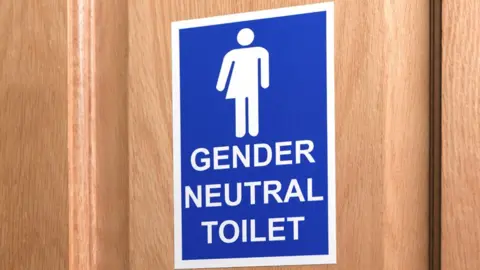 Getty Images
Getty ImagesThe government first promised guidance for schools in relation to transgender pupils more than five years ago.
And while the Department for Education (DfE) says it will finally publish new guidance for schools in England this term, for many this cannot come soon enough.

Finding a school willing to talk about its transgender policies is almost impossible.
BBC News contacted head teachers across England but almost all were too anxious to be interviewed on camera. They did not want to draw attention to their school - or pupils who identify as trans or non-binary.
In 2018, the government said it would work with the human-rights watchdog to publish "comprehensive guidance for schools on how to support trans pupils". Without it, many schools are making their own decisions, such as whether to introduce gender-neutral toilets or changing rooms - and how they are used.
Some teachers told BBC News they worried whatever they did would "not only be criticised but publicly vilified" and, while schools needed clarity, it was a "no-win" situation.
Others said they might have to consult solicitors, amid fears of doing the "wrong thing".
Head teacher Kevin Sexton told BBC News many schools wanted better guidance and advice to help make decisions "in the best interests of the child".
His, Chesterfield High School, a mixed-sex comprehensive in Crosby, Merseyside, has developed its own approach.
The school has more than 1,200 pupils, 10-20 of whom identify as transgender, non-binary or gender fluid.
There are single-sex and gender-neutral toilets, with floor-to-ceiling lockable cubicles and a supervising member of staff. And private PE changing rooms, used by all the trans pupils, are available to all.
The school's support for children questioning their gender identity had been developed over the past decade, Mr Sexton said.
"We've tried to create a school that's tolerant and inclusive," he said.
"We'll work with individual children to actually think about what they want to use and access - and it becomes really manageable."
Chesterfield High had never faced a challenge from parents - but other head teachers had.
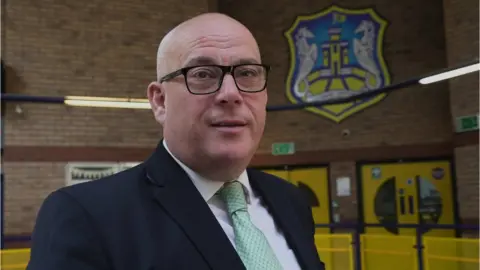 Gemma Laister
Gemma LaisterUsing the survey tool Teacher Tapp, BBC News asked almost 7,000 teachers in England a series of questions about their experience with transgender pupils.
About 8% of primary-school teachers said they taught trans or non-binary pupils, compared with 75% in secondary.
And just over half said they would not be very or at all confident about the next steps to take if a child wanted to change their name, use different pronouns or change their appearance, hairstyle or clothes - what is known as socially transitioning.
When and how schools should involve parents if a child wishes to identify as a gender different to their birth sex - and what to do if a parent disagrees - are among the most controversial matters the guidance is expected to address.
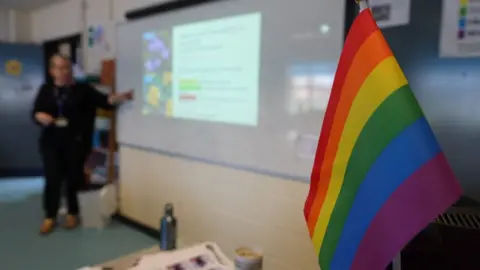 Gemma Laister
Gemma LaisterA report into gender-identity services in England says socially transitioning may have significant psychological effects - and better information is needed about its outcomes.
And last year, an NHS England consultation proposed socially transitioning should be considered in certain circumstances only, such as to alleviate or prevent "clinically significant distress".
About three-quarters of the teachers in the Teacher Tapp survey said their school would support a child who wished to socially transition.
And 39% of the secondary teachers who responded said they would support this, regardless of parental consent.
School trips
"Everyone involved in a child's life should work together and investigate why a child may feel a certain way," says Tanya Carter, of the Safe Schools Alliance organisation, which is worried about how some schools are managing gender identity.
"Teachers are not doctors. [Socially transitioning] is something that should only be done with medical oversight. Concerns arise when schools affirm someone as the opposite sex, locking in what may or not may not be a transient phase in that child's life."
The organisation receives several messages every day from both parents and teachers worried about toilets, changing rooms, sports and overnight accommodation on school trips becoming mixed-sex.
"We get parents who have found out that their children have been socially transitioned behind their backs at schools, because the schools haven't spoken to parents," Miss Carter says. "Schools are keeping secrets from parents."
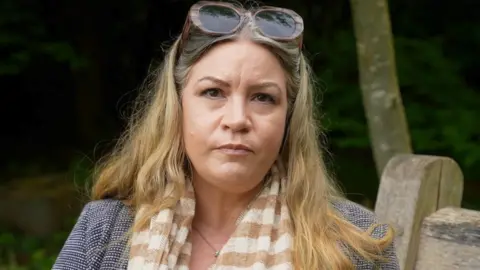 Gemma Laister
Gemma LaisterPenni Allen, who runs Chesterfield High's wellbeing unit, says the school takes parents' views into account but that "doesn't mean that we're not going to continue supporting that child".
The school tries to de-escalate any emotions and issues with parents and help the child understand what they are feeling.
"Some children will come and say they're just exploring," Mrs Allen says. "Others will say they've been feeling this way for quite some time. They might just be at the start of a journey that never goes anywhere.
"It's not about putting them on a pathway. We don't put your child in a box and put a label on it that says, 'Your child is now trans.'
"We like to think we've got a good relationship with parents here… and hopefully, we get it right."
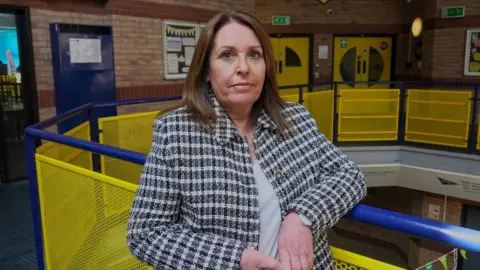 BBC/Gemma Laister
BBC/Gemma LaisterBBC News spoke to parents of trans children at other schools in England but, as with teachers, it is difficult to find a view everyone agrees with and will speak about on record.
Some parents told BBC News they did not want any decisions made without their approval and were not happy with their children changing their names or pronouns.
Some felt their children may be struggling with their sexual orientation, rather than gender identity, and needed space and time to explore that before making other decisions, which could potentially lead down a medical pathway such as puberty blockers.
But others wanted schools to put their child's choices first, regardless of their own involvement, and were supportive of their trans identity and socially transitioning.

- Listen to the 5 Minutes On podcast: Gender Identity in Schools - "Teachers can't do their jobs properly"

The decisions schools make, or do not make, can have a huge impact on the young people affected.
Ellie, 18, was the first pupil to publicly identify as non-binary at their Catholic school, an isolating and frustrating experience.
The lack of government guidance means teachers "can't do their jobs properly", Ellie says. And they were "learning as they went" when Ellie wanted help.
"A lot of them just don't know how to deal with things - or they're worried about saying the wrong thing, especially with it being a faith school," Ellie says.
"It's just really important that teachers and school staff feel like they know what they're talking about when a student comes to them and they're facing a gender-identity issue or a sexuality issue."
And teachers' worries about the reaction from the media and some parents may be a barrier to schools making changes that support pupils.
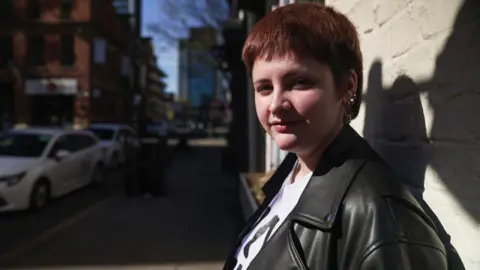 BBC/Dan Nelson
BBC/Dan NelsonThe guidance will build upon existing guidelines to protect people from discrimination.
But in a move signalling just how sensitive the matter is, the Department for Education will publish a draft for consultation before the final guidance is issued, which is rare for non-statutory - advisory, rather than compulsory - guidance.
It is likely to cover issues such as whether single-sex schools are legally obliged to admit transgender pupils or whether schools should inform parents if their child is questioning their gender.
It may also offer advice on sleeping arrangements during residential trips and how to manage single-sex sports. But it is not clear whether schools would receive additional funding to help them make any changes.
A Department for Education official said it was "important that we take the time to get this right" so the guidance on such "sensitive matters" was "as clear as possible for schools". The guidance would be "based upon the overriding principle of the wellbeing and safeguarding of children, and it will consider a range of issues".
Every day, Teacher Tapp asks thousands of primary and secondary teachers, in both the state and private sector, questions about their experiences in the classroom.
According to the survey for BBC News, 9% say there are adequate support services to which to refer children experiencing unease about their gender identity.
The Association of School and College Leaders (ASCL) says it receives a "steady stream" of inquiries from its members.
In 2022, alongside other teaching unions, it published guidance on balancing transgender pupils' needs with those of others, within the legal framework of the Equality Act.
But ASCL director of policy Julie McCulloch says without official guidance, schools are working "in a vacuum". And it is calling for it to be published and fully consulted on as soon as possible.
"There are parents and people in the wider school community who understandably have very strong views about this issue," Ms McCulloch says. "So there's also pressure coming on schools from their communities to make sure they get this right."
Additional reporting by Larissa Tairo.

Have you been affected by the issues in this story? Email your experiences [email protected].
Please include a contact number if you are willing to speak to a BBC journalist. You can also get in touch in the following ways:
- WhatsApp: +44 7756 165803
- Tweet: @BBC_HaveYourSay
- Upload pictures or video
- Please read our terms & conditions and privacy policy
If you are reading this page and can't see the form you will need to visit the mobile version of the BBC website to submit your question or comment or you can email us at [email protected]. Please include your name, age and location with any submission.

